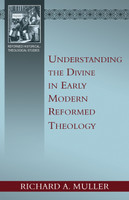
Muller, Richard A.
Description
In Understanding the Divine, Richard A. Muller clarifies concepts and distinctions used by Reformed theologians of the sixteenth and seventeenth centuries to discuss the essence, attributes, and Trinitarian nature of God. He wipes away caricatures of Calvin and succeeding generations of Reformed theologians as revolutionary thinkers by showing where they retrieved their concepts, the contexts that demanded them to employ those ideas, and what they actually meant. Reading these essays, one comes to see the Reformed tradition as a conservative movement that developed patristic and medieval understandings of God in ways to address emerging problems and concerns of their day.
Contents
Acknowledgments
Introduction
Index
Endorsements
“It is well known that the Reformers took issue with Rome on matters of soteriology and ecclesiology, and rightly so. Unfortunately, some have assumed that such a polemic also extended to the rest of Christian theology, as if ‘Protestant’ and ‘scholastic’ were completely antithetical to one another. The brilliance of Richard Muller’s scholarship is his careful unravelling of such caricatures, often driven by today’s agendas, that have led too many to neglect the intentional catholicity that defined Reformed scholasticism. By excavating its doctrine of God, Muller demonstrates the variegated ways Reformed scholastics drew on the best medieval theologians, including Thomas Aquinas. Muller dismantles dismissive readings from neoorthodoxy and Radical Orthodoxy to unveil the persistent retrieval of classical theism and the many ways it complemented the distinctives of Reformed theology. If Muller’s career has shown us anything, it is this: historic Reformed theology is a true participant in the one holy catholic and apostolic church.”
—Matthew Barrett, professor of Christian theology, Midwestern Baptist Theological Seminary; director of the Center for Classical Theology; author of The Reformation as Renewal
“This collection of essays is a laudable complement to the third and fourth volumes of Richard Muller’s monumental Post-Reformation Reformed Dogmatics. The Reformers and their immediate successors were not content to simply restate the orthodox doctrine of God inherited from the medievals and church fathers. As Muller demonstrates, Calvin and his Reformed heirs were also engaged in further finessing the Christian understanding of how to relate the divine essence and attributes to our talk about the three divine persons. This volume charts the progression and development of that undertaking while fruitfully engaging dissenting contemporary interpretations of the primary sources. The result is a challenging and deeply instructive volume.”
—James E. Dolezal, professor of theology, Cairn University, Langhorne, Pennsylvania
About the Author
Richard A. Muller is P. J. Zondervan Professor of Historical Theology Emeritus at Calvin Theological Seminary and scholar in residence at Puritan Reformed Theological Seminary. He is the author of numerous books, including Divine Will and Human Choice, Grace and Freedom, and the multivolume Post-Reformation Reformed Dogmatics.